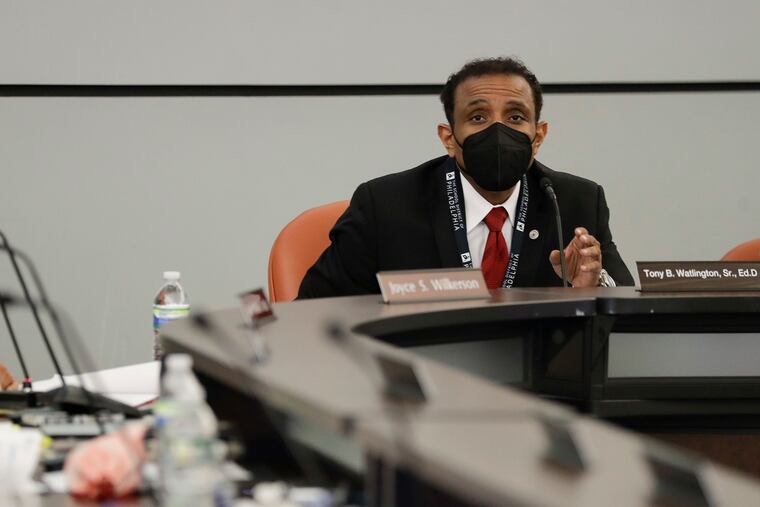Philly schools voted to borrow millions to pay bills, something it has to do every July, and projected deficits starting in 2026
The school district seated two new board members, and heard budget updates that amount to a $500 million deficit over five years.

The Philadelphia school board authorized borrowing $500 million Thursday, a sum it needs to pay its bills as it waits for the state and local funds that pay for much of its expenses.
The board takes a similar action every July, authorizing Tax and Revenue Anticipation Notes because of the uneven flow of revenue to the Philadelphia School District.
With a nearly $4 billion budget, most paid for through Harrisburg and City Hall, the district cannot control when it receives the money, and that makes for lean times midsummer.
“It’s all about timing,” said Uri Monson, the district’s chief financial officer. The district doesn’t get nearly a quarter of its funding, about $1 billion from the city’s real estate collections, until March. But its expenditures and big-ticket items like payroll and charter school payments must be paid regularly and begin July 1, the start of the fiscal year.
Tax and Revenue Anticipation Notes, or TRANs, are “standard government practice,” Monson said, and must be borrowed and repaid within the same fiscal year.
The district will pay about $13.8 million in interest and fees for the temporary borrowing, and locked in at an interest rate of 2.89%, based on a competitive bidding process.
Philadelphia is borrowing less this year than it did last — $500 million vs. $550 million — because of a healthier fund balance. The city also has had to resort to temporary borrowing in the past, but did not need to this year because of federal funds. The district is in a different position, however, because it spends most of its budget up front and is then reimbursed for costs.
In some years, the district has split its borrowing into two segments to cut down on interest costs, but that seemed unwise this year with rates creeping up; analysts advised the district to borrow whatever it needs in one shot.
Board members also received an update to the school system’s budget. Monson noted several changes wrought by passage of the city and state budget that, in sum, mean the district has a grimmer financial picture than initially projected: a $46 million deficit by fiscal year 2026, and a $485 million deficit by fiscal year 2027.
While the state upped its funding to Philadelphia through basic education dollars and a program that gives more money to its poorest districts, it still allocated less than what Gov. Tom Wolf proposed, and charter changes the district was hoping for did not materialize.
Much can shift between now and then, Monson said, but the five-year projection is a warning to “be aware that we’re going to need help.”
Board members expressed continued frustration over the district’s funding picture.
Mallory Fix Lopez said district students are “continually disserviced” and schools lack the basics “because adults aren’t doing their jobs.” Without meaningful action by the city and state, the district could have to cut some counselors, mental health supports, and assistant principals — as well as other programs and positions now paid for with federal funds. And it will surely hear from legislators if it makes those cuts.
“It’s disgusting,” Fix Lopez said of the funding issues.
Board member Lisa Salley also expressed frustration.
“Why can’t we also look at nontraditional revenue sources?” Salley said.
Two new members joined the board at its meeting Thursday. Sarah-Ashley Andrews, a family therapist who founded a suicide-prevention nonprofit, and Chau Wing Lam, a former district employee who now works as director of operations for the Philadelphia Academy of School Leaders, were chosen by Mayor Jim Kenney and recently confirmed by City Council.
Andrews and Lam replace board members Angela McIver, who resigned last summer, and Maria McColgan, who resigned this spring.
Andrews, a native Philadelphian and graduate of Saul High School, said in a statement she was eager to dive into board work and is “passionate about equipping students throughout the city of Philadelphia to gain access to the necessary tools needed to become self-sufficient leaders in the city of Philadelphia.”
Lam, parent of a charter school student, said in a statement she was “thrilled to bring to the board the combination of my experiences as an English language learner, the first in my family to attend college, a parent, a former staff member within the district, and an Asian American citizen.”